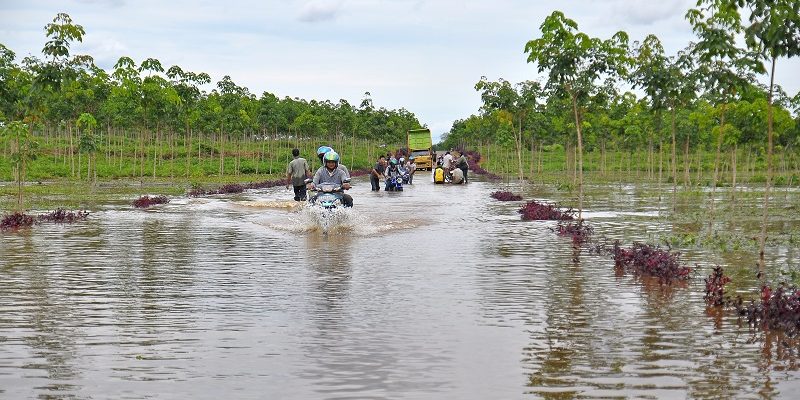Climate Resilience Webinar Series Highlights Opportunities for Recovery in South Asia

ICLEI South Asia and CDKN organised a series of webinars on climate resilience and its various aspects, including urban and peri-urban planning, gender, and green economic recovery in the context of COVID-19. The webinars were held every Thursday of August 2020.
The objective of the session on Climate Resilience Planning and Action: Experiences from South Asia was to discuss the challenges South Asian cities are facing and the resilience-building initiatives being undertaken by public and private sector stakeholders. Watch this webinar.
Atiq Rahman, Executive Director, Bangladesh Centre for Advanced Studies, said at the event: “Resilience is a long-standing concept in biology and a new one in disaster management. The newer concept of resilience encompasses the idea that a society needs to bounce back ecologically, socially and economically.”
As is commonly known, cities are not just key contributors to GHG emissions, but can play a key role in leading climate action to inspire their regions and national government. Moreover, robust planning to address systemic climate fragility and to enhance the adaptive capacity of vulnerable communities can go long way in promoting sustainable development of cities.
Talking about capacity building, Lauren Sorkin, Acting Executive Director, Global Resilient Cities Network, said, “Climate change is a tremendous challenge, but not a technological one. It is primarily an institutional, political and capacity challenge. We have to invest in cities and this is about building capacity.”
During the Gender-Responsive Climate Resilience webinar, the speakers discussed the challenges being faced and overcome by women during the ongoing pandemic and the learnings therefrom that can be used for advancing climate action. Watch this webinar.
The discussion revolved around how women specifically are disproportionately affected by climate change due to many factors, such as their capacity to respond, inadequate and unequal access to essential resources such as land, water, energy and finance, and inadequate access to information and technology. Combined with climate change, the COVID-19 pandemic threatens to slow down or reverse the progress achieved so far in gender equality.
Kalyani Raj, Secretary-General, All India Women’s Conference, said, “A climate policy needs to be inclusive, factor in socio-economic roles, acknowledge local solutions, take an institutional approach and inter-weave gender from inception. All these actions will bring in a multitude of benefits.”
Agreeing with this argument, Shaila Shahid, Senior Advisor-Climate Change, DRR & Gender, ICCCAD, added, “The key action points for resilience recovery with a gender lens includes building links between climate action and sustainable recovery from COVID-19; sustainability of women’s livelihoods; green jobs for women in sectors impacted by the pandemic; equal representation and meaningful participation of women in disaster management; and ensuring that climate finance reaches women.”
The webinar on Peri-Urban Ecosystems: The Silent Contributor in Building Urban Climate Resilience looked into how big a role peri-urban ecosystems play in supporting urban climate resilience. The experts talked about protecting ecosystems and ecosystem services in peri-urban areas, which are essential not only to the survival of the marginalised populations that live there and are dependent on them for their livelihoods but also for the cities. Watch this webinar.
Anil Kumar Gupta, Head, Environment, Climate, and Disaster Risk Management, NIDM, rightly said, “Peri-urban systems are important for climate resilience. They can provide alternative drainage systems and provide buffers to local water bodies. Secondly, if we improve the amenities in peri-urban areas, they can help to decongest the core areas in cities.”
“To improve the environmental services in peri-urban areas, increase carbon sequestration, improve air quality and watershed health, replenish groundwater, mitigate heat islands and protect and restore wildlife habitat,” Shipra Narang Suri, Chief, Urban Practices Branch, UN-HABITAT, suggested during the discussion.
At the Financing Local Climate Resilience session, the discussion focused on best practices to accelerate sustainable and green recovery, including opportunities for local resilience actions that support national climate commitments and long-term climate strategies in South Asian cities. In addition, various ways to strengthen adaptation and resilience to future shocks were also discussed. Watch this webinar.
Joanne Manda, Regional Advisor, Climate Change, and Innovative Finance, UNDP, said, “There is enough finance for climate resilience. It’s about understanding the ways we can leverage and catalyse it.”
The session also discussed that financial interventions, while addressing the short-term health and economic urgencies, must also consider the chronic climate crisis to design a resilient and green recovery. These interventions must break the practice of unsustainable investments and support the cities to move towards meeting the Paris Agreement goals.
“There is no need for new investment for green recovery. Use the money you have. Drive investment into different projects in new ways,” Stefanos Fotiou, Director, Environment and Development Division, UNESCAP, said.



